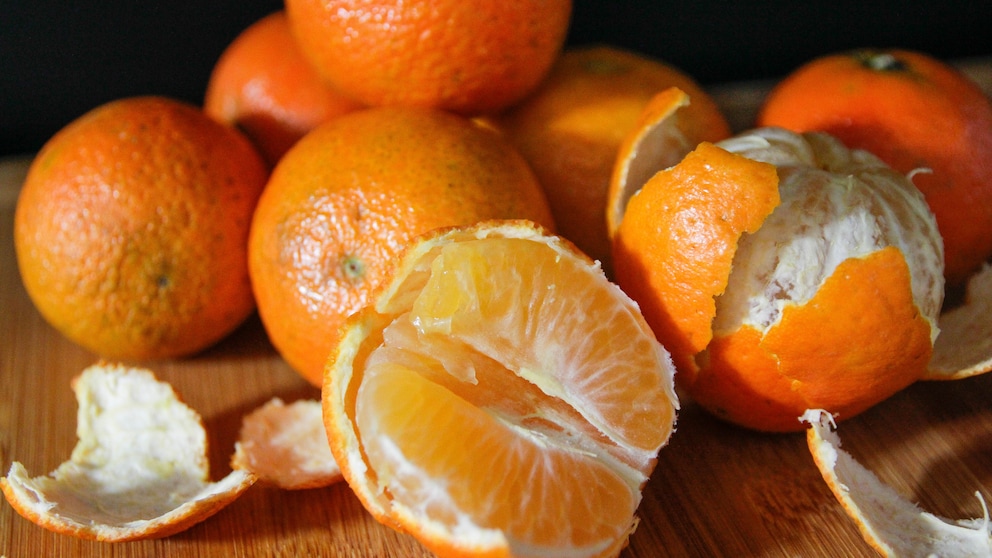December 15, 2024, 2:49 pm | Read time: 4 minutes
They exude a lovely aroma, are a staple on any colorful plate, and are an essential part of the winter and Christmas season: Mandarins. How healthy is this orange-colored fruit? And can the white part be eaten?
Did you know that mandarins and oranges are pretty similar in terms of nutrients? With a few exceptions: Mandarins contain significantly more beta-carotene (a precursor to vitamin A) but slightly less vitamin C. The tangerine is not only delicious but also a super healthy food – with some amazing properties.
Overview
These Nutrients Are Found in Mandarins
The following nutritional information applies to 100 grams of peeled mandarin oranges.1
- Energy: 54 kcal
- Protein: 0.7 grams
- Carbohydrates: 10.1 grams
- Fat: 0.3 grams
- Dietary fiber: 1.7 grams
Vitamins and minerals
- Vitamin C: 30 milligrams (30 percent of the daily requirement)
- Potassium: 160 milligrams (4 percent of the daily requirement)
- Vitamin A precursors: 27 micrograms (3 percent of the daily requirement)
How Mandarins Protect Against Diseases
Even though mandarins are not exactly overflowing with vitamins and minerals (with the exception of vitamin C), they contain other substances that also do great things for your health. These are beta-cryptoxanthin, naringin, hesperidin, tangeretin, and nobiletin. These are antioxidants or flavonoids, some of which are only found in mandarins and have been shown to have anti-inflammatory, anti-cancer, blood pressure-regulating, and heart-protective properties.2,3 In short, these plant compounds play a major role in preventing certain diseases from developing in the first place.
Mandarins Support a Strong Immune System
If only everything were that simple: two or three tasty mandarins a day (depending on size), and your daily vitamin C requirement is literally covered. With this strategy, you have a good chance of getting through the winter in good health and possibly without catching a cold. Why is vitamin C essential for a healthy and strong immune system? It promotes the body’s own production of phagocytes. These cells are also known as phagocytes, as they have the ability to absorb and destroy pathogens such as bacteria and viruses.4 Vitamin C is also an effective beauty booster, as it stimulates collagen production in the skin.5 Collagen ensures strong and firm connective tissue, and it is, therefore, once again essential for stressed winter skin.

Nutrition Expert Assesses Vegetable Red Cabbage is Very Healthy and Low in Calories

Nutrition Expert Explains This is How Healthy Carrot Juice Is

Expert explains Nutritional recommendations for strength athletes – what and when you should eat to build muscle
“Miracle Substance” Nobiletin Protects the Brain and Keeps You Slim
As mentioned above, mandarins contain a compound called nobiletin. And this seems to have really noble properties. There is evidence from animal studies that the plant substance can protect against Alzheimer’s and Parkinson’s by slowing down the accumulation of Alzheimer’s plaques in the brain. Nobiletin is also said to strengthen dopamine-producing cells. Destruction of these cells leads to the progression of Parkinson’s disease.6
And as if mandarins weren’t healthy enough, the brain-protecting nobiletin seems to be a kind of diet miracle. In 2020, a US study discovered that the compound prevented fats from food from ending up on the hips.7 As a result, the small test subjects (mice, with human studies still pending) remained slim and maintained healthy blood lipid levels, even when consuming a high-calorie diet and “rodent junk food.” The scientists suspect that nobiletin apparently blocks the body’s own fat metabolism. It will be some time before the mechanism behind this is fully researched. However, science already shows that mandarins are super healthy and should be eaten twice as often as is common.

